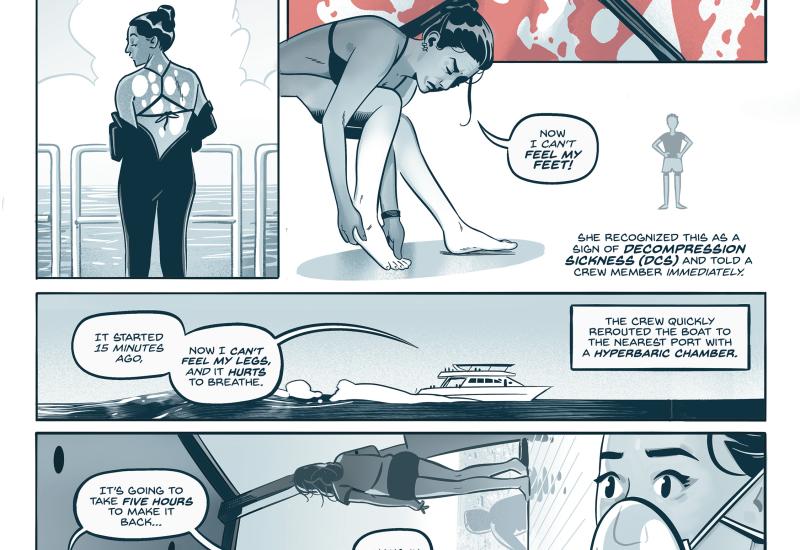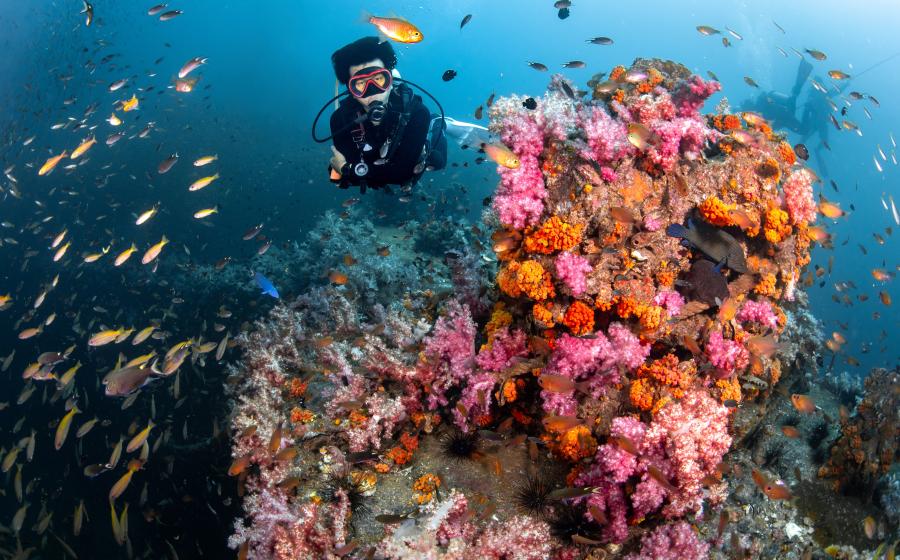Lessons for Life: A Not-So-Smart Night Dive

A Not-So-Smart Night Dive
Poor decisions have deadly consequences for this diver.
Jori Bolton
When Lenny dropped his smartphone into the water from the lake’s dock, he immediately wanted to recover it as he hoped he could dry it to avoid replacing it. But the dock owners told him there was too much boat traffic to dive safely, and refused to let him get in the water. Lenny complied, but then waited until the dock was closed for the night and returned. He suited up in his dive gear, and a few moments later, Lenny was standing on the bottom of the lake underneath the pier where he thought his phone might be. He wasn’t having any luck finding it. Taking a step backward, Lenny felt something wrap around his foot and he panicked.
The Diver
Lenny was a 47-year-old diver who didn’t exercise often. He dived only occasionally, and while he owned his gear, some of it hadn’t been serviced in a while. Lenny smoked and liked to drink. At his last physical, his doctor told Lenny he had high blood pressure.
The Dive
Lenny was on a fishing trip at a local lake with some friends. The fish weren’t biting, so he ended up drinking more beer than he planned. When the group returned to the dock and unloaded their gear, Lenny stumbled and dropped his phone into the water. He wanted to jump in and look for it immediately, but the dock owners were busy with boaters who were using the dock to get supplies and fuel or to pick up passengers. The owners could also tell Lenny had been drinking and wanted to discourage him from getting in the water.
After leaving the dock and thinking about his missing phone for a few more hours — and continuing to drink — Lenny convinced one of his friends to drive him back to the lake so he could make a night dive and search for his phone. The buddy wasn’t a diver, but Lenny wasn’t worried about making the dive alone. He was confident he could find his phone in a few minutes.
The Accident
When Lenny arrived at the dock and began to assemble his dive gear, he realized he forgot his dive fins. He reasoned that wouldn’t be a problem because he didn’t expect to be swimming much anyway. He planned to walk into the water and make his way under the dock. Lenny entered the water while his buddy waited in the truck. Lenny had a dive light, although he wasn’t carrying a backup.
Like many boat docks, the bottom was littered with debris and valuables people had dropped — phones, sunglasses, coolers, cans and just about everything else. Lenny struggled to walk in the soft sediment of the lake’s bottom, but managed to trudge to the end of the pier. By then he was in 15 feet of water.
There is no way of knowing exactly what happened next because Lenny was diving without a buddy. Lenny’s friend saw him surface and wave his arms, but by the time the friend got out of the truck to help Lenny out the water, Lenny was gone. Fishermen found Lenny’s body the next day.
Analysis
The autopsy showed Lenny had signs of pulmonary barotrauma and intravascular gas, which occurs when a diver ascends rapidly while holding his or her breath. Air expanding in the lungs tears a hole in the lung tissue and escapes into the bloodstream through blood vessels in the lungs. If these air bubbles enter the arterial circulation, the diver exhibits stroke-like symptoms that present almost immediately. An air bubble entering the brain will get trapped and block further blood flow. Symptoms include paralysis, loss of consciousness and cardiac arrest.
The friend theorized that Lenny panicked on the bottom for some reason and bolted for the surface, but we will never know. What is known is that he ascended rapidly without exhaling. Lenny also had a blood alcohol concentration of .17 percent — twice the legal limit for driving an automobile.
Obviously, Lenny used poor judgment, amplified by the alcohol, and paid the ultimate price. Dive accidents rarely happen for a single, simple reason. Rather, dive accidents happen when a small problem occurs that the diver is unable to cope with properly. This can happen because of lack of training, lack of experience in the particular environment, or physical conditions like intoxication. When the diver cannot react to the problem properly, panic ensues and perceptual narrowing begins. In moments, a diver progresses from a normal dive to one in which he or she thinks the only option is to bolt for the surface.
In Lenny’s case, poor judgment and intoxication were the contributing factors that led to his death. It’s likely that entanglement or something else caused him to panic, and then he forgot his training. At that point, the rest was inevitable.
Lessons for Life
1. Stay sober before a dive. You may think having one or two beers is OK, but it’s better not to take the risk. If you get in trouble, having a clear head may make the difference.
2. Don’t dive solo or attempt a search and recovery dive without proper training and equipment.
3. Practice emergency procedures so you are prepared to respond to a problem when it occurs.
4. Be smart about your diving. Nothing is worth risking your life.
More Lessons for Life:
Lose Your Focus, Lose Your Life | Disobedience Spells Disaster | Fatal One-Way Trip to the Bottom
Scuba Diving readers know Eric Douglas as the author of “Lessons for Life,” but he’s also an adventure writer whose latest novel, Heart of the Maya, has just been released, the fifth in Douglas’ Mike Scott dive adventure series. Get a taste of the action with “Sharks on Land,” an exclusive Mike Scott short story wherein the protagonist breaks up an illegal shark-finning group in the Bahamas, written just for Scuba Diving’s readers.

Jori BoltonPoor decisions have deadly consequences for this diver.
When Lenny dropped his smartphone into the water from the lake’s dock, he immediately wanted to recover it as he hoped he could dry it to avoid replacing it. But the dock owners told him there was too much boat traffic to dive safely, and refused to let him get in the water. Lenny complied, but then waited until the dock was closed for the night and returned. He suited up in his dive gear, and a few moments later, Lenny was standing on the bottom of the lake underneath the pier where he thought his phone might be. He wasn’t having any luck finding it. Taking a step backward, Lenny felt something wrap around his foot and he panicked.
The Diver
Lenny was a 47-year-old diver who didn’t exercise often. He dived only occasionally, and while he owned his gear, some of it hadn’t been serviced in a while. Lenny smoked and liked to drink. At his last physical, his doctor told Lenny he had high blood pressure.
The Dive
Lenny was on a fishing trip at a local lake with some friends. The fish weren’t biting, so he ended up drinking more beer than he planned. When the group returned to the dock and unloaded their gear, Lenny stumbled and dropped his phone into the water. He wanted to jump in and look for it immediately, but the dock owners were busy with boaters who were using the dock to get supplies and fuel or to pick up passengers. The owners could also tell Lenny had been drinking and wanted to discourage him from getting in the water.
After leaving the dock and thinking about his missing phone for a few more hours — and continuing to drink — Lenny convinced one of his friends to drive him back to the lake so he could make a night dive and search for his phone. The buddy wasn’t a diver, but Lenny wasn’t worried about making the dive alone. He was confident he could find his phone in a few minutes.
The Accident
When Lenny arrived at the dock and began to assemble his dive gear, he realized he forgot his dive fins. He reasoned that wouldn’t be a problem because he didn’t expect to be swimming much anyway. He planned to walk into the water and make his way under the dock. Lenny entered the water while his buddy waited in the truck. Lenny had a dive light, although he wasn’t carrying a backup.
Like many boat docks, the bottom was littered with debris and valuables people had dropped — phones, sunglasses, coolers, cans and just about everything else. Lenny struggled to walk in the soft sediment of the lake’s bottom, but managed to trudge to the end of the pier. By then he was in 15 feet of water.
There is no way of knowing exactly what happened next because Lenny was diving without a buddy. Lenny’s friend saw him surface and wave his arms, but by the time the friend got out of the truck to help Lenny out the water, Lenny was gone. Fishermen found Lenny’s body the next day.
Analysis
The autopsy showed Lenny had signs of pulmonary barotrauma and intravascular gas, which occurs when a diver ascends rapidly while holding his or her breath. Air expanding in the lungs tears a hole in the lung tissue and escapes into the bloodstream through blood vessels in the lungs. If these air bubbles enter the arterial circulation, the diver exhibits stroke-like symptoms that present almost immediately. An air bubble entering the brain will get trapped and block further blood flow. Symptoms include paralysis, loss of consciousness and cardiac arrest.
The friend theorized that Lenny panicked on the bottom for some reason and bolted for the surface, but we will never know. What is known is that he ascended rapidly without exhaling. Lenny also had a blood alcohol concentration of .17 percent — twice the legal limit for driving an automobile.
Obviously, Lenny used poor judgment, amplified by the alcohol, and paid the ultimate price. Dive accidents rarely happen for a single, simple reason. Rather, dive accidents happen when a small problem occurs that the diver is unable to cope with properly. This can happen because of lack of training, lack of experience in the particular environment, or physical conditions like intoxication. When the diver cannot react to the problem properly, panic ensues and perceptual narrowing begins. In moments, a diver progresses from a normal dive to one in which he or she thinks the only option is to bolt for the surface.
In Lenny’s case, poor judgment and intoxication were the contributing factors that led to his death. It’s likely that entanglement or something else caused him to panic, and then he forgot his training. At that point, the rest was inevitable.
Lessons for Life
1. Stay sober before a dive. You may think having one or two beers is OK, but it’s better not to take the risk. If you get in trouble, having a clear head may make the difference.
2. Don’t dive solo or attempt a search and recovery dive without proper training and equipment.
3. Practice emergency procedures so you are prepared to respond to a problem when it occurs.
4. Be smart about your diving. Nothing is worth risking your life.
More Lessons for Life:
Lose Your Focus, Lose Your Life | Disobedience Spells Disaster | Fatal One-Way Trip to the Bottom
Scuba Diving readers know Eric Douglas as the author of “Lessons for Life,” but he’s also an adventure writer whose latest novel, Heart of the Maya, has just been released, the fifth in Douglas’ Mike Scott dive adventure series. Get a taste of the action with “Sharks on Land,” an exclusive Mike Scott short story wherein the protagonist breaks up an illegal shark-finning group in the Bahamas, written just for Scuba Diving’s readers.










